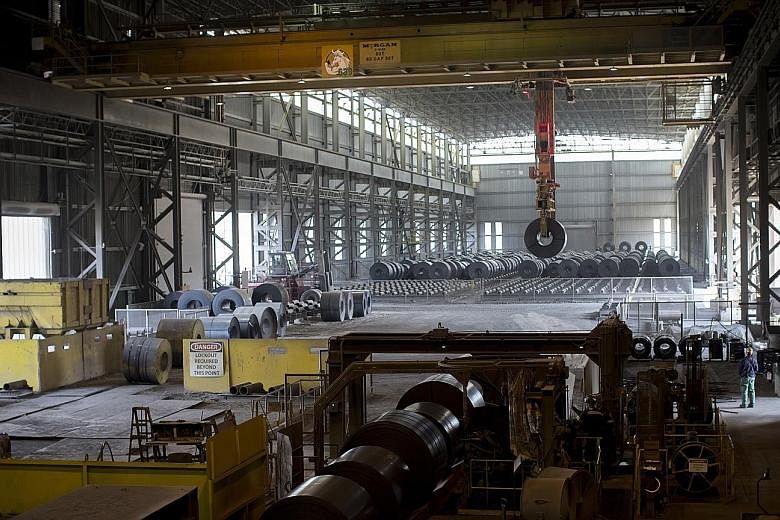SHANGHAI • While US steel and aluminium producers surged last Friday after the Commerce Department released its recommendations for restricting imports, a muted reaction among the biggest Asian metals stocks suggests the international impact will be spread thinly - unless US action prompts retaliation from its biggest suppliers.
Japan's top steelmakers, Nippon Steel & Sumitomo Metal and JFE Holdings, and its largest maker of aluminium products, UACJ, all rose in Tokyo, while Posco, South Korea's biggest steel mill, was unchanged.
The reaction came as US President Donald Trump's administration weighs tariffs as high as 53 per cent on steel and 23.6 per cent on aluminium. The proposals risk a chain effect under which curbs on US imports encourage other nations to impose duties - top producer China has already warned as much - or divert shipments to alternative markets, SMBC Nikko Securities said.
Still, the direct impact on Japanese steelmakers should be limited, given the small volumes the country sends to the United States, the brokerage said.
The aim of the tariffs is to boost US output to at least 80 per cent of capacity by cutting steel imports by 13.3 million metric tonnes and aluminium imports by 669,000 tonnes, according to the Commerce Department. Those volumes represent less than 1 per cent of world steel supply outside the US, and about 1 per cent of aluminium output.
Some smaller companies did see more significant gyrations in their shares. In South Korea, SeAH Steel, which sells pipes to the US, dropped as much as 7.6 per cent, while Japan's Yamato Kogyo gained as much as 8 per cent because of its large US operation that would be untouched by duties. The impact on other producers, such as Luxembourg-based ArcelorMittal and Brazil's Gerdau, would also be cushioned by their significant US businesses.
South Korea is one of 12 countries, including China, that could be subject to the highest steel tariff, but which excludes Japan and Canada, the top supplier to the US. A second option presented by the Commerce Department would be a duty of 24 per cent on all countries.
For aluminium, Mr Trump's options also include a higher tariff, of 23.6 per cent, on five major suppliers, including China and Russia. The other option is an across-the-board levy of 7.7 per cent.
Stocks of Ford Motor and General Motors slumped last Friday amid fears expressed by some lawmakers that trade protection would push up costs for domestic manufacturers.
Mr Trump has until mid-April to decide on any potential action and could still seek negotiations with producers.
BLOOMBERG

